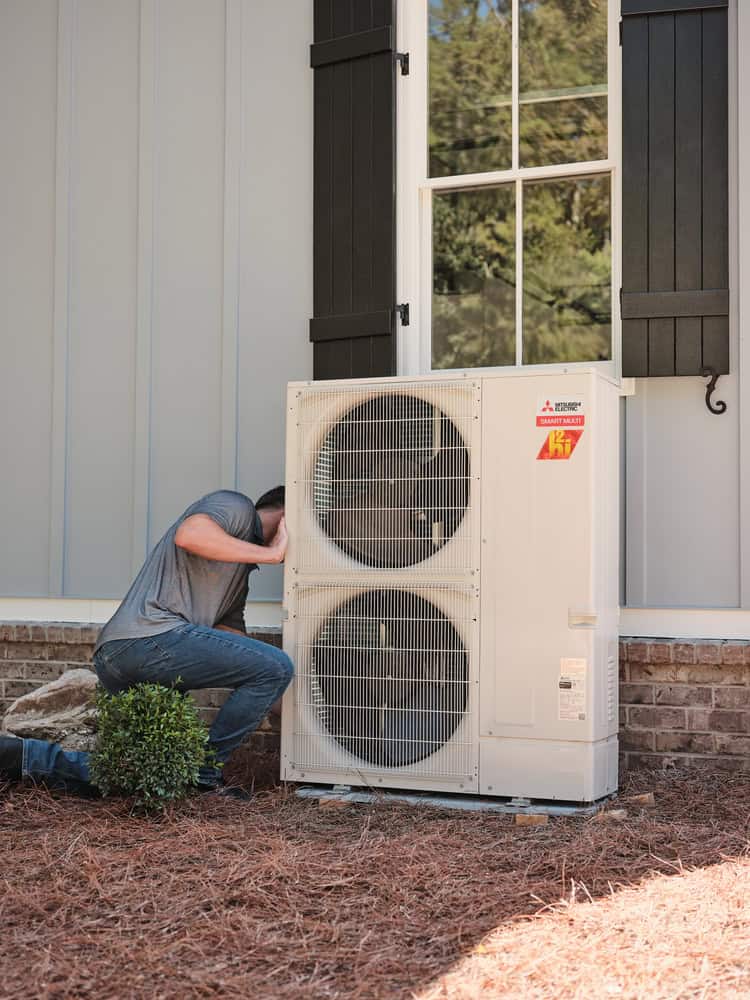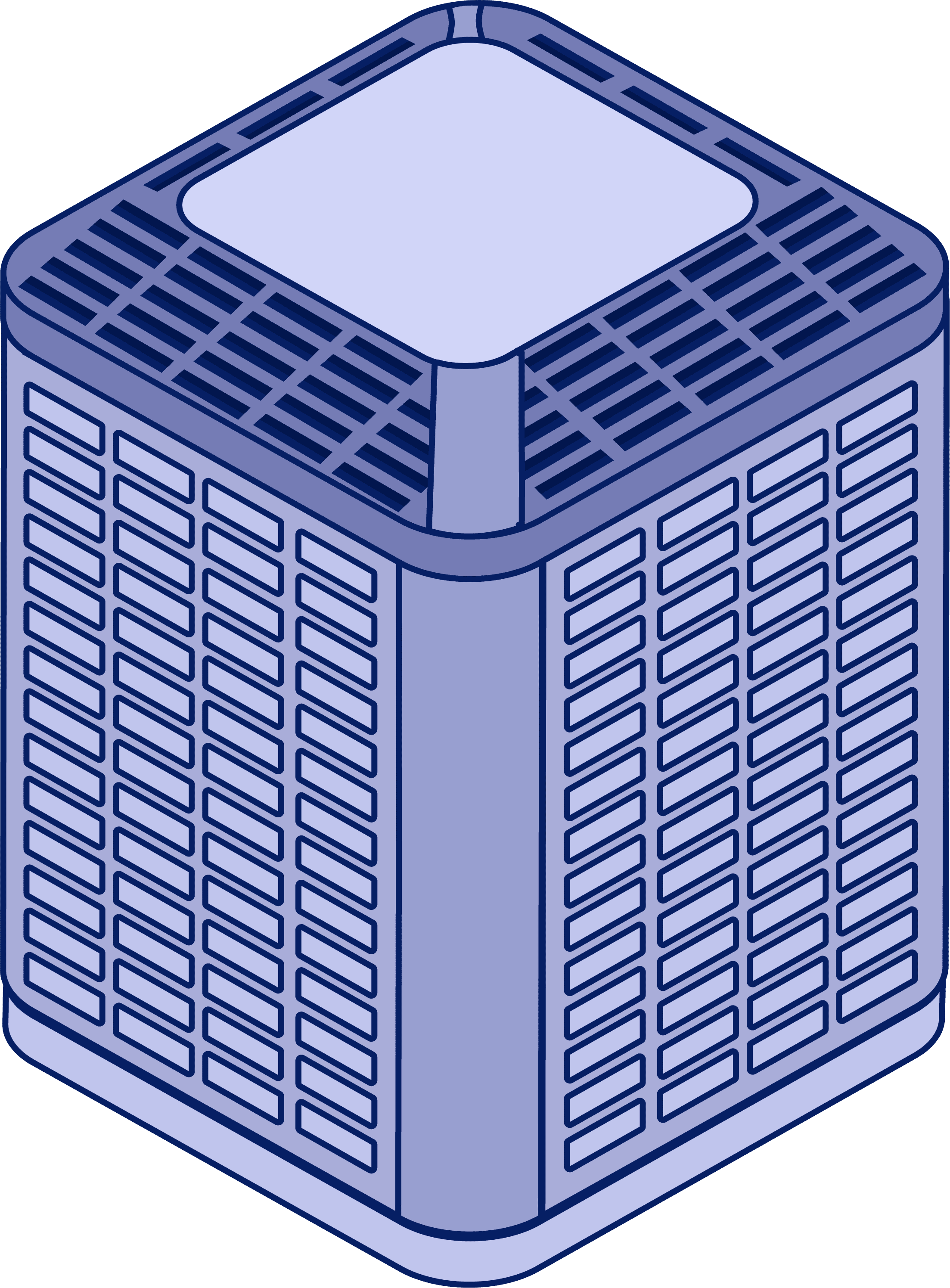Most of our customers paid around $9,400 – $14,200 in Q1 2025 for a cold climate heat pump (out of pocket) depending on the rebates they were eligible for.
The median full cold climate heat pump system out-of -pocket-cost for our installs is $12,800. This price usually includes a 20+ SEER cold climate heat pump, air handler, installation, material and permitting.
Most new heatpump units require a new or compatible furnace to function at high efficiency. We do not recommend installing an air-source heatpump on an old furnace; however, if your furnace is newer than 5-years old, it may be compatible with an airsource heatpump system.
| Type of System | Cost Range |
|---|---|
| Air-Source Heatpump | $8,250 to $20,420 |
| Cold Climate Air-Source Heatpump | $10,150 to $28,370 |
Heat Pump Installation Cost
The cost of installing an air source heat pump will depend on a number of factors, including the size of your home, the type of heat pump you choose, and the complexity of the installation.
For example, cost to replace heat pump and air handler in an average 2000 sq. ft home can be as low as $10,500 and can be as high as $24,200 on average before any rebates. After rebates, most UniColorado customers paid around $12,800.
In addition to the cost of the heat pump and installation, you may also want to budget for any necessary modifications to your home, such as adding insulation to improve energy efficiency or upgrading your electrical panel to make room for the heatpump’s electrical circuits. These additional costs can vary widely depending on the specific needs of your home.
It’s important to note that the initial cost of installing an air source heat pump may be higher than other types of heating systems, but it can save you money on energy costs in the long run.
In the meanwhile, here are some rough estimates for ducted heat pump cost:

Heat Pump Sizing
Properly sizing an air source heat pump is important to ensure that it is able to effectively heat and cool your home. If the heat pump is too small, it will struggle to keep up with the heating and cooling demand of your home and may not provide sufficient comfort. If the heat pump is too large, it may short cycle, leading to reduced efficiency and higher energy costs.
There are several factors that should be considered when sizing an air source heat pump, including:
The size of your home: The size of your home will determine the size of the heat pump you need. Larger homes will require a larger and more powerful heat pump to heat and cool the space effectively.
The insulation of your home: Insulation helps to keep the heat in your home during the winter and out during the summer. If your home is well-insulated, you may be able to get away with a smaller heat pump.
The climate in which you live: The climate in which you live will also affect the size of the heat pump you need. If you live in a colder climate, you will need a larger and more powerful heat pump to provide sufficient heating.
The type of fuel you use: The type of fuel you use to heat your home can also affect the size of the heat pump you need. If you currently use a gas furnace, you may need a larger heat pump to compensate for the lack of heat provided by gas.
Heat Pump Tons
One ton of cooling capacity is equal to the ability to cool 12,000 British thermal units (BTUs) per hour. So, a 3-ton heatpump can push out 36,000 cooling BTUs. The size of an HVAC system is often measured in tons of cooling capacity, with larger systems typically being able to cool larger areas or spaces.
Most air-source systems come in 12,000 BTU increments (1-ton). Typically, the smallest airsource condenser size is 24,000 cooling BTUs and can be as high as 60,000 cooling BTU’s. Most heatpump-compatible residential furnaces have a capacity range between 40,000 – 120,000 heating BTUs. Air Source Heatpumps also require high-efficiency indoor coils, which are installed on top of the furnace and connect your heatpump to your airhandler.
We recommend having the sizing and assessment completed by an HVAC professional so the system is properly sized and working towards meeting the projects needs. We have compiled a simplified range of capacity for condensing units that you can find below.
| Area Size | Cooling BTUs Required | Tonnage |
|---|---|---|
| 1000 sq. ft. & below | 24,000 BTUS | 2 tons |
| 1000 sq. ft. - 2000 sq. ft. | 24,000 - 36,000 BTUs | 2 - 3 tons |
| 2000 sq. ft. - 3000 sq. ft. | 36,000 - 48,000 BTUs | 3 - 4 tons |
| 3000 sq. ft. & above | 48,000 - 60,000 BTUs | 4 - 5 tons |
| System Size | Cost Range |
|---|---|
| 2 Ton Heat pump | $9,100 to $14,200 |
| 3 Ton Heat pump | $9,600 to $15,600 |
| 4 Ton Heat pump | $10,080 to $16,500 |
| 5 Ton Heat pump | $11,080 to $17,600 |
Heat Pump Installation Rebates
Xcel Energy's Energy Efficiency Program
This program offers rebates to residential account holders who install qualifying heat pumps in their homes.
At UniColorado, we do all the paper work for our customers and claim this rebate for you up-front and provide it as a discount. This rebate saves our customers $8,200 on average.
| System Type | 2025 Rebate |
|---|---|
| Air Source Heatpump | $900 / heating ton |
| Cold Climate Air Source Heatpump | $2,250 / heating ton |
| MiniSplit Heatpump | $900 / heating ton |
| Cold-Climate MiniSplit Heatpump | $2,250 / heating ton |
Denver Climate Action Rebates
The City & County of Denver offers a number of rebates and incentives to help Denver residents and businesses reduce their energy consumption and adopt more sustainable practices. The Denver Climate Action Rebate is paid directly to the contractor & therefore applied as a discount from the start.
| System Type | 2024 Rebate |
|---|---|
| Air Source Heatpump | $1,500 |
| Cold Climate Air Source Heatpump | $3,500 |
| MiniSplit Heatpump | $1,500 |
| Cold-Climate MiniSplit Heatpump | $3,500 |
A cold climate air source heat pump is specifically designed to work in colder temperatures, with an outdoor temperature range of around 15°F to 60°F. These heat pumps are equipped with special features, such as a defrost mode and a high-pressure compressor, that allow them to continue to operate effectively in colder temperatures.
Living in our great state of Colorado, it might seem that a cold climate air source heat pump may be a better choice for your home but keep in mind that these cold climate heat pumps are generally much more expensive than regular heat pumps; Cold-Climate air-source heatpumps are typically top of the line & feature-packed halo products that are produced in much fewer numbers. Our country’s fragile supply chain has also put additional strain on sourcing and installation of these highly specialized units.
Last note: Most cold-climate air-source heatpump units require a variable speed furnace to function correctly. Most cold climate untis also require a communicating furnace; Cold-Climate units can also be installed on variable speed electric airhandlers as well. Variable Speed & Communicating features are typically reserved for the high-end product lines which add additional cost for cold climate air source heatpump installation projects.
| System Size | Cost Range |
|---|---|
| 2-Ton - cc Heatpump Combination System | $11,100 to $18,050 |
| 3-Ton - cc Heatpump Combination System | $12,800 to $20,410 |
| 4-Ton - cc Heatpump Combination System | $14,270 to $22,905 |
| 5-Ton - cc Heatpump Combination System | $16,820 to $28,210 |
What Factors Affect Heat Pump Installation Cost?
There are several factors that can affect the cost of installing an air source heat pump, including:
- Air conditioning Infrastucture: Whether you’ve had a central AC unit in your home before can affect the cost. If your home has never had central airconditioning before, new refrigerant lines and power circuits have to be established to support the heatpump. This can add additional cost to your total heatpump installation cost. If you’ve never had furnace or ductwork, check out our Minisplit cost calculator.
Size of your home: The size of your home will affect the cost of installation because larger homes will require a larger and more powerful heat pump to heat and cool the space effectively.
Type of heat pump: The type of heat pump you choose will also affect the cost of installation. For example, cold climate heatpumps are more expensive or fully electric units require more work and therefore will cost more than a regular heatpump.
Complexity of the installation: The complexity of the installation will also affect the cost. For example, if you need to install new ductwork or make other modifications to your home to accommodate the heat pump, this will add to the cost of the installation. Another big expense that homeowners may have to prepare for is their electrical panel. If your electrical panel is full, you may need an upgrade to support the new heatpump system
Contractor: The contractor you choose to install your heat pump will also affect the cost. Heatpump units are complicated and require extensive experience to be installed correctly; while some fly-by-night contractors might offer cheap seeming pricing, don’t expect quality work. You get what you pay for, so make sure your contractor has ample heatpump expertise like UniColorado Heating & Cooling.
| Additional Costs | Cost Range |
|---|---|
| Electrical Panel Upgrade (if required) | $3,200 to $5,200 |
| Refrigerant Lineset & 220v Circuit Installation | $600 to $2,400 |
Do You Need An Electrical Panel Upgrade For Heat Pump Installation?
It is possible that you may need to upgrade your electrical panel to accommodate an air source heat pump.
Heat pumps require a significant amount of electrical power to operate, and if your electrical panel is not capable of providing enough power, you may need to upgrade it. This is especially true if you are adding a heat pump to an older home that may not have been designed to accommodate the electrical demands of a heat pump.
To simplify, adding an airsource heatpump condensing/outdoor unit to a house that hasn’t had central AC before requires two free spaces in your electrical panel; If you want to electrify your airhandler or furnace as well, you need two additional free spots.
The electrical scope required for air-source heatpump installation is typically one 208-220v circuit with an amperage that commonly ranges between 15 amps to 40 amps. If the furnace is also being replaced with an electric furnace, you’ll need an additional 20-50a 220v circuit to terminate at the furnace location. If you don’t have free spaces in your electrical panel, a panel replacement may be necessary. In certain cases, as allowed by electrical code, certain circuits may be condensed in the panel so a full upgrade may not be required.
In projects with a tighter budget, installation of an electrical sub panel is relatively cheaper comparted to an electrical panel upgrade; Installing a subpanel is common for installing heatpump systems. A Full Electrical Panel Upgrade can tack on an additional cost anywhere from $3,100 to $5,200 depending on the level of complexity to install or alter. An Electrical Subpanel Installation may cost as little as $1,500 to $2,000 and above.
It is important to note that an electrical panel upgrade can be a significant expense, so it is always a good idea to factor this into your budget when planning to install an air source heat pump.
Heat Pump Efficiency Ratings
Heat pump efficiency is typically measured by the coefficient of performance (COP). The COP is a ratio that compares the amount of heat the heat pump produces to the amount of electricity it consumes. For example, a heat pump with a COP of 3 produces 3 units of heat for every 1 unit of electricity it consumes. In addition to the COP, heat pump efficiency is also typically measured by the seasonal energy efficiency ratio (SEER) and the heating seasonal performance factor (HSPF).
The Heating Seasonal Performance Factor (HSPF) is a measure of the efficiency of a heat pump’s heating function. HSPF is calculated by dividing the total amount of heating provided by the heat pump during the heating season by the total electricity consumed by the heat pump during that same period. A higher HSPF rating indicates a more efficient heat pump. The minimum HSPF rating for air source heat pumps is 7.7, but most modern heat pumps have an HSPF rating of 8 or higher. Heat pumps with an HSPF rating of 9 or higher are considered highly efficient in producing heat.
The Seasonal Energy Efficiency Ratio (SEER) is a measure of the efficiency of a heat pump’s cooling function. SEER is calculated by dividing the total amount of cooling provided by the heat pump over a cooling season by the total electricity consumed by the heat pump during that same period. The SEER rating measures the efficiency of the heat pump’s cooling system, while the HSPF rating measures the efficiency of the heat pump’s heating system. The minimum SEER rating for air source heat pumps is 13, but most modern heat pumps have a SEER rating of 14 or higher. Heat pumps with a SEER rating of 16 or higher are considered high efficiency and can provide significant energy savings in the summer.
Heat pumps with a high SEER rating and a high HSPF rating are generally more efficient and can help to reduce energy costs. It is always a good idea to choose a heat pump with a high efficiency rating to ensure that you are getting the most energy-efficient and cost-effective system for your home.
A heat pump is a type of heating and cooling system that uses electricity to transfer heat from one location to another. Heat pumps work by using a refrigerant to absorb heat from the air or ground outside and transfer it inside to heat the home. In the summer, the process is reversed, and the heat pump removes heat from the inside of the home and releases it outside, cooling the home.
Heat pumps have several benefits, but there are also some potential drawbacks to consider:
Upfront cost: Heat pumps can be more expensive to purchase and install than other types of heating systems, especially if you need to make modifications to your home to accommodate the heat pump.
Limited heating capacity: Heat pumps are generally less effective at heating homes in very cold climates, and they may struggle to maintain a comfortable temperature during extreme cold spells. Some heat pumps have a backup heating source, such as a gas furnace, to help overcome this limitation.
Installing a heat pump can be a good choice for homeowners who are looking to reduce their energy costs and carbon footprint. Heat pumps are generally more energy efficient than other types of heating systems and can help to lower energy bills over the long term.
Heat pumps also have a number of other benefits, including:
Quiet operation: Many air source heat pumps operate quieter compared to other types of forced-air systems.
Versatility: Heat pumps can be used for both heating and cooling, making them a good all-in-one solution for many homes.
Environmentally friendly: Heat pumps do not burn fossil fuels, which makes them a more environmentally friendly choice compared to other types of heating systems.
In general, you can expect the installation of a airsource heatpump systems to take anywhere from a half-day to a full day or more.
Here are some of the factors that can impact the length of time it takes to install a heat pump system:
Complexity of the installation: If the installation requires extensive modifications to your home, such as adding ductwork or installing new electrical wiring, it will take longer to complete.
Accessibility: If the installation requires access to tight or hard-to-reach spaces, it will take longer to complete.
Experience of the installer: A skilled and experienced installer will generally be able to complete the installation more quickly than a less experienced one.
Roughly, you may need a heat pump with a capacity of around 2 to 3 tons (24,000 to 36,000 BTUs per hour) for a 2000 sq ft house.
Here are some rough estimates for the cost of a heat pump for a 2000 square foot home:
- Heatpump only: $6,950 – $8,930 w/ 17SEER High Efficiency Heatpump
- Heatpump + Airhandler/Furnace: $13,410 – $17,420
Here are some rough estimates for the cost of a heat pump for a 3000 square foot home:
- Heatpump only: $8,620 – $11,952 with 17SEER High Efficiency Heatpump
- Heatpump + Airhandler/Furnace: $15,410 – $20,305 with 17SEER High Efficiency Heatpump


